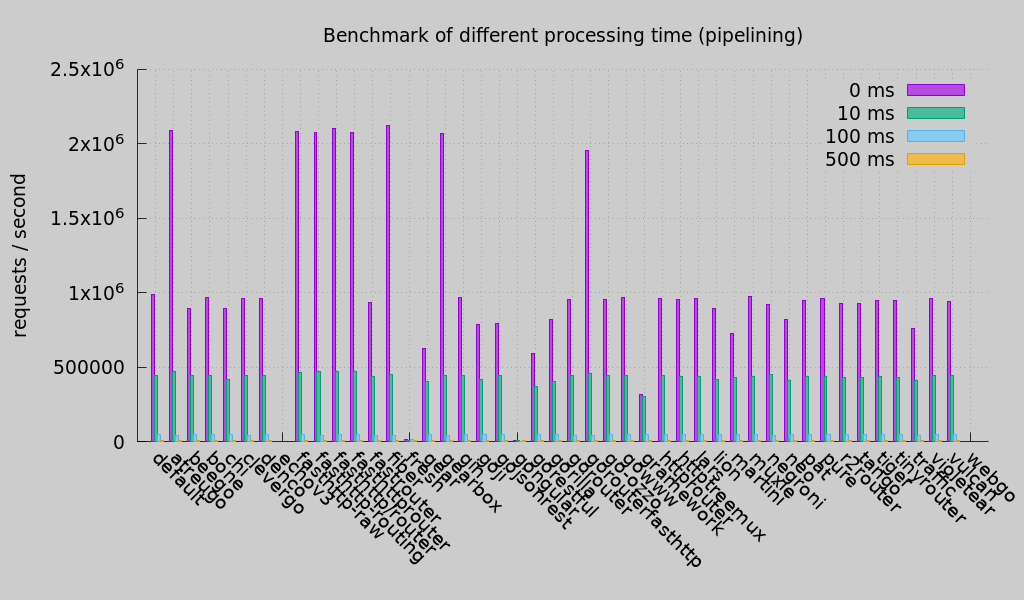gearbox ⚙️ is a web framework for building micro services written in Go with a focus on high performance. It's built on fasthttp which is up to 10x faster than net/http
- Secure 🔐
- Fast 🚀
- Easy to use 👓
- Lightweight
⚙️ gearbox requires version 1.14 or higher of Go (Download Go)
Just use go get to download and install gearbox
go get -u github.com/gogearbox/gearboxpackage main
import (
"github.com/gogearbox/gearbox"
)
func main() {
// Setup gearbox
gb := gearbox.New()
// Define your handlers
gb.Get("/hello", func(ctx gearbox.Context) {
ctx.SendString("Hello World!")
})
// Start service
gb.Start(":3000")
}package main
import (
"github.com/gogearbox/gearbox"
)
func main() {
// Setup gearbox
gb := gearbox.New()
// Handler with parameter
gb.Get("/users/:user", func(ctx gearbox.Context) {
ctx.SendString(ctx.Param("user"))
})
// Start service
gb.Start(":3000")
}package main
import (
"log"
"github.com/gogearbox/gearbox"
)
func main() {
// Setup gearbox
gb := gearbox.New()
// create a logger middleware
logMiddleware := func(ctx gearbox.Context) {
log.Printf("log message!")
// Next is what allows the request to continue to the next
// middleware/handler
ctx.Next()
}
// create an unauthorized middleware
unAuthorizedMiddleware := func(ctx gearbox.Context) {
ctx.Status(gearbox.StatusUnauthorized)
.SendString("You are unauthorized to access this page!")
}
// Register the log middleware for all requests
gb.Use(logMiddleware)
// Define your handlers
gb.Get("/hello", func(ctx gearbox.Context) {
ctx.SendString("Hello World!")
})
// Register the routes to be used when grouping routes
routes := []*gearbox.Route{
gb.Get("/id", func(ctx gearbox.Context) {
ctx.SendString("User X")
}),
gb.Delete("/id", func(ctx gearbox.Context) {
ctx.SendString("Deleted")
}),
}
// Group account routes
accountRoutes := gb.Group("/account", routes)
// Group account routes to be under api
gb.Group("/api", accountRoutes)
// Define a route with unAuthorizedMiddleware as the middleware
// you can define as many middlewares as you want and have
// the handler as the last argument
gb.Get("/protected", unAuthorizedMiddleware, func(ctx gearbox.Context) {
ctx.SendString("You accessed a protected page")
})
// Start service
gb.Start(":3000")
}package main
import (
"github.com/gogearbox/gearbox"
)
func main() {
// Setup gearbox
gb := gearbox.New()
// Serve files in assets directory for prefix static
// for example /static/gearbox.png, etc.
gb.Static("/static", "./assets")
// Start service
gb.Start(":3000")
}- CPU 3.1 GHz Intel Xeon® Platinum 8175M (24 physical cores, 48 logical cores)
- MEMORY 192GB
- GO go 1.14.6 linux/amd64
- OS Linux
For more results, check Our Docs
- Add a GitHub Star
- Suggest new features, ideas and optimizations
- Report issues
- Donating a cup of coffee
Check Our Docs for more information about gearbox and how to contribute
Organizations that are helping to manage, promote, and support Gearbox ⚙️
 |
|---|
| trella: A B2B technology platform and trucking marketplace that connects shippers with carriers |
Gearbox ⚙️ is being used by multiple organizations including but not limited to
Feel free to chat with us on Discord, or email us at [email protected] if you have questions, or suggestions
gearbox is licensed under MIT License
Logo is created by Mahmoud Sayed and distributed under Creative Commons License







